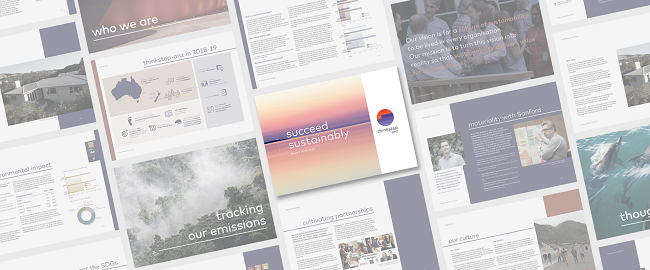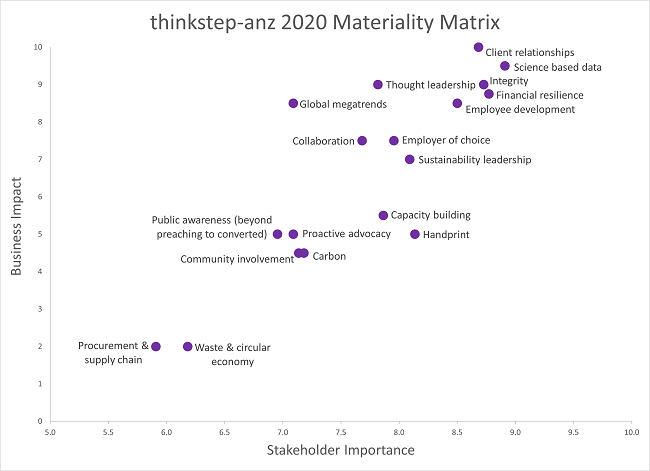Guest Blog: Sustainability Reporting: a worthy endeavour
Sustainability reporting is at the core of being a sustainable business. You can’t manage what you can’t measure, and reporting also enables the transparency and accountability that underpin strong sustainability activity. But for smaller organisations, pulling together the information to produce these reports can seem daunting. thinkstep-anz share their reporting journey to help other organisations on the path to success.
Sustainability reporting is at the core of being a sustainable business. You can’t manage what you can’t measure, and reporting also enables the transparency and accountability that underpin strong sustainability activity. But for smaller organisations, pulling together the information to produce these reports can seem daunting.
We have just launched Succeed Sustainability—thinkstep-anz’s first sustainability report, and we want to share our reporting journey in case other organisations might find this useful.
Preparing this report has also provided an opportunity for us to reflect on the first two years of being an independent company, to work through feedback from our last sustainability update, apply methods that we offer our clients like assessments and carbon footprinting, and pull together diverse aspects of our operations into an organic whole.

What we reported on
Succeed Sustainability covers the years 2018 and 2019 and lays out:
- who we are and what we do
- how we ‘walk the talk’
- how we see the sustainability landscape changing
- how we have changed
- how we prepare for the future
We took inspiration from Global Report Initiative (GRI) and Integrated Reporting (<IR>

Reporting on today and tomorrow
Following the above framework, we outline our achievements and highlights, some case studies as well as our ambitions for the future. The case studies cover client projects like EPDs, innovative approaches like regenerative foresighting, and the development of methodologies like handprinting.
We gained B Corp certification and set an emissions reduction target in line with 1.5 degrees approved by the Science Based Targets initiative. These signal our pathway forward as an environmentally and socially committed organisation. Our actions to ‘give back’ as part of our B Corp commitments are demonstrated through our contributions to various organisations in the sustainability community. We also continued our series of free ‘Straight from the horse’s mouth’ webinars and workshops which are centred around sharing industry and business perspectives. Finally, we are proud of the impact that our reports on the built environment and transport had, as well as the traction they got with media.
We decided to go further with SBC’s recommendations, setting ourselves the challenge of laying out future sustainability trends alongside our materiality assessment and foresighting work. By tapping into the expertise of our team, we settled on a chapter that introduced future-thinking methods while also addressing sustainability trends relevant to Australian and New Zealand businesses.
Reporting on environmental impact
Communicating environmental impact is one of the cornerstones of sustainability reporting. Likewise, walking the talk through accurate and transparent data has long been a guiding principle for what we do at thinkstep-anz.
To make a difference on New Zealand’s carbon emissions, businesses big and small can play a part. We offer readers a view into how we identify, track, and reduce our carbon footprint. Our footprint of nearly 92 tonnes of CO₂e is dominated by our scope 3 or indirect emissions. Over 60% of our emissions resulted from our increased activity across the Tasman and participation in sustainability events, as well as commuting for our steadily growing team. With our science-based target we have committed to reduce those scope 3 emissions by 38% by 2030, and our Scope 1 & 2 emissions by 52%.
Scope 3 also includes our purchased goods and services and here we begin to see why accurate measuring and reporting is so vital. Because we lacked detailed data from some suppliers, we had to use generic data to complete our assessments. In future, better data on our supply chain would help refine our reporting, as well as pinpoint hotspots and make improvements accordingly. Developments in this area would in turn contribute to our wider ambitions around responsible procurement and integrated lower-impact supply chains.

A team effort
Producing a report fully in-house takes many skills. We are grateful to everyone in the team for contributing numbers, ideas, graphics, wordsmithing, and their enthusiasm throughout the whole project.
While it was a big effort, preparing the report has also been an extremely valuable experience which we would recommend to every business, small or big, privately owned or listed. It was an opportunity for everyone at thinkstep-anz to reflect back on what has happened, but also to inform our approach and strategy moving forward. Overall, we wished to create a cohesive narrative throughout the report, linking our achievements and current sustainability performance to our ambition to continuously improve the positive impacts of thinkstep-anz and its peers.
While the report covers 2018 and 2019, it has of course been influenced by the current COVID-19 reality and our readiness to prepare for changes we see on the horizon. With this, as with sustainability more broadly, it is important to always challenge our thinking, take on board lessons and identify opportunities to broaden our positive impact.
By Tim Worth and Barbara Nebel, thinkstep-anz.
Contact: Tim Worth and Barbara Nebel, thinkstep-anz
